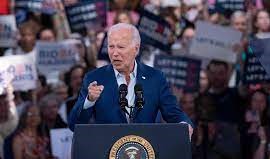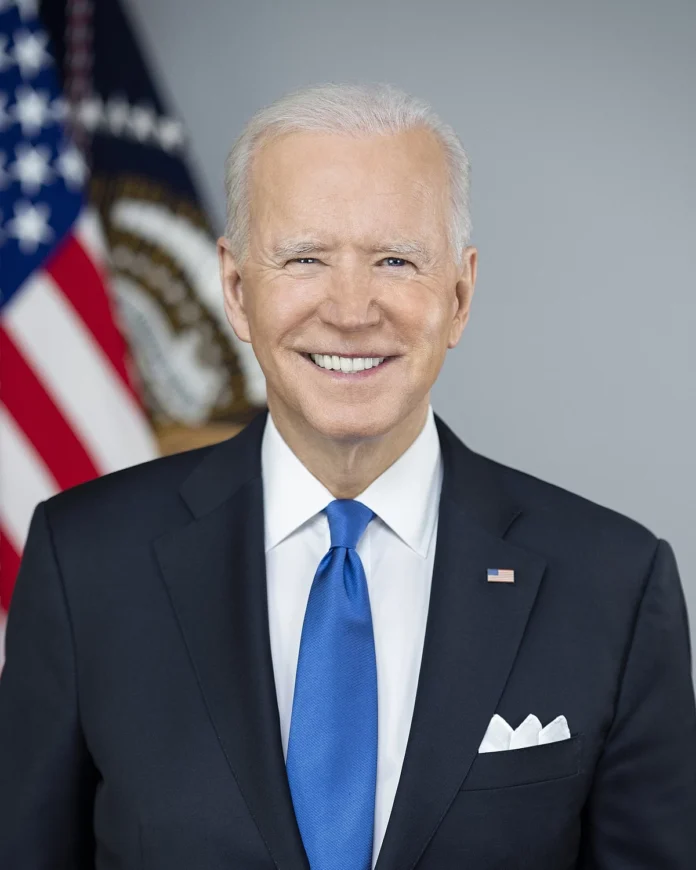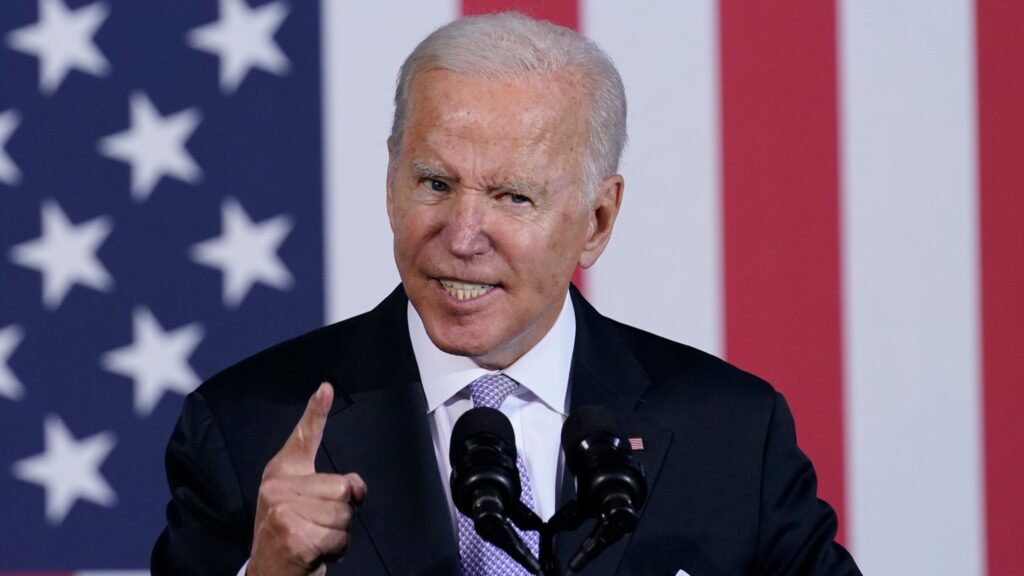Introduction
Joe Biden known as Joseph Robinette Biden Jr., became the 46th President of the United States on January 20, 2021. His presidency follows a long and distinguished career in public service, including his tenure as Vice President under Barack Obama from 2009 to 2017 and a lengthy Senate career representing Delaware. Biden’s presidency has been marked by efforts to address the COVID-19 pandemic, economic challenges, climate change, and significant social issues. This essay explores Biden’s life, political career, and his presidency’s defining moments and policies.
Early Life and Career
Early Years and Education
Born into a Catholic family on November 20, 1942, in Scranton, Pennsylvania, Joe Biden embodies the values of hard work and faith. He was the eldest of four siblings. The Biden family faced financial difficulties, but Joe’s parents instilled in him a sense of resilience and determination.
Biden attended the University of Delaware, where he majored in history and political science. He was an average student but an exceptional leader, serving as class president and playing football. He later attended Syracuse University College of Law, graduating in 1968.
Early Political Career
Biden’s political career began in 1970 when he was elected to the New Castle County Council in Delaware. His success at the local level set the stage for his election to the U.S. Senate in 1972. He was elected to the Senate at the age of 29, making him one of the youngest individuals ever to hold that position. However, his early political success was marred by personal tragedy when his first wife, Neilia, and their daughter, Naomi, died in a car accident shortly after his Senate election. His sons Beau and Hunter were injured but thankfully survived. This tragic event profoundly impacted Biden’s life and career.
Senate Career
Legislative Achievements
During his 36-year tenure in the Senate, Biden established himself as a leader on foreign relations, criminal justice, and drug policy. He was a prominent member and later chairman of the Senate Foreign Relations Committee, playing a key role in shaping U.S. foreign policy. Biden supported arms control agreements, NATO expansion, and interventions in the Balkans.
Biden also chaired the Senate Judiciary Committee, where he was instrumental in crafting the Violent Crime Control and Law Enforcement Act of 1994. This legislation, although controversial, aimed to reduce crime rates through measures such as increased police presence and tougher sentencing laws. Biden’s role in the passage of the Violence Against Women Act in 1994 was another significant achievement, providing critical resources and protections for victims of domestic violence and sexual assault.
Controversies
Biden’s Senate career was not without controversy. He faced criticism for his handling of the Supreme Court confirmation hearings of Clarence Thomas in 1991, particularly the treatment of Anita Hill, who accused Thomas of sexual harassment. Biden’s support for the 1994 crime bill has also been scrutinized, with critics arguing that it contributed to mass incarceration, particularly affecting minority communities.

Vice Presidency
Partnership with Barack Obama
In 2008, Biden was selected as Barack Obama’s running mate in the presidential election. Obama and Biden formed a strong partnership, with Biden bringing extensive legislative experience and foreign policy expertise to the ticket. They won the election and were re-elected in 2012.
Key Initiatives
As Vice President, Biden played a critical role in several key initiatives. He was tasked with overseeing the implementation of the American Recovery and Reinvestment Act of 2009, which aimed to stimulate the economy following the Great Recession. Biden also focused on foreign policy, representing the U.S. in diplomatic efforts around the world.
Biden’s work on the Cancer Moonshot initiative, launched after his son Beau died of brain cancer in 2015, aimed to accelerate cancer research and improve cancer treatment. This personal and professional commitment to combating cancer underscored his dedication to public health issues.
Presidential Campaign
2020 Election
After initially deciding not to run for president in 2016, Biden announced his candidacy for the 2020 presidential election. He positioned himself as a unifying figure who could restore stability and integrity to the White House following the divisive presidency of Donald Trump. Biden’s campaign focused on issues such as healthcare, climate change, racial equity, and rebuilding the economy.
Victory and Inauguration
Biden won the Democratic nomination and selected Senator Kamala Harris as his running mate, making her the first woman, first Black woman, and first Asian-American woman to be elected Vice President. Biden and Harris won the election with a record number of votes, reflecting widespread public support.
Biden’s inauguration on January 20, 2021, took place under unprecedented circumstances due to the COVID-19 pandemic and heightened security concerns following the January 6 Capitol riot. His inaugural address emphasized themes of unity, healing, and renewal.
Presidency
COVID-19 Response
One of Biden’s immediate priorities upon taking office was addressing the COVID-19 pandemic. He implemented a comprehensive strategy to increase vaccination rates, enhance testing and contact tracing, and provide economic relief to individuals and businesses affected by the pandemic. The American Rescue Plan, a $1.9 trillion economic stimulus package, was passed in March 2021 to provide direct payments to Americans, extend unemployment benefits, and support vaccination efforts.
Economic Policies
Biden’s economic agenda aimed to promote recovery and long-term growth. The Infrastructure Investment and Jobs Act, signed into law in November 2021, allocated $1.2 trillion to modernize the nation’s infrastructure, including roads, bridges, public transit, and broadband internet. This investment was intended to create jobs and improve the country’s economic competitiveness.
Biden also proposed the Build Back Better plan, a sweeping social spending package focused on expanding childcare, education, and healthcare, as well as addressing climate change. While the plan faced significant legislative challenges, it represented a cornerstone of Biden’s vision for a more equitable and sustainable future.
Climate Change and Environmental Policies
Climate change has been a focal point of President Biden’s administration. He rejoined the Paris Agreement on his first day in office, signaling a renewed commitment to international climate cooperation. Biden’s administration set ambitious goals for reducing greenhouse gas emissions, aiming for a 50-52% reduction by 2030 compared to 2005 levels.
The administration also launched initiatives to promote clean energy, including investments in renewable energy sources, electric vehicles, and energy-efficient infrastructure. The appointment of climate experts to key positions within the administration underscored Biden’s commitment to addressing the climate crisis.
Social and Racial Equity
Biden has made significant efforts to address social and racial inequities. His administration has focused on reforming the criminal justice system, expanding voting rights, and combating systemic racism. The George Floyd Justice in Policing Act, aimed at addressing police misconduct and promoting accountability, was a key legislative priority.
Biden also prioritized increasing diversity and representation within his administration. His cabinet and staff appointments included individuals from diverse backgrounds, reflecting a commitment to inclusivity.
Foreign Policy
Biden’s foreign policy prioritizes the revitalization of alliances and the reinstatement of America’s global leadership. He reaffirmed commitments to NATO and other international partnerships, seeking to counter the influence of authoritarian regimes such as China and Russia. The withdrawal of U.S. troops from Afghanistan in August 2021, ending America’s longest war, was a significant and controversial decision that highlighted the challenges of addressing complex global conflicts.
Challenges and Criticisms
Biden’s presidency has faced numerous challenges and criticisms. The handling of the Afghanistan withdrawal drew widespread scrutiny, with critics pointing to the chaotic evacuation process and the rapid takeover of the country by the Taliban. Domestically, the administration has grappled with ongoing issues such as inflation, immigration, and political polarization.
Despite these challenges, Biden has remained focused on advancing his policy agenda and addressing the pressing needs of the American people. His presidency represents a critical period in American history, marked by efforts to navigate complex global dynamics and address profound domestic issues.
Conclusion
Joe Biden’s presidency is a testament to his unwavering dedication to public service throughout his life. From his early years in the Senate to his tenure as Vice President and now as President, Biden has demonstrated a dedication to addressing the needs and challenges of the American people. His administration’s focus on unity, healing, and progress reflects a vision for a more equitable and sustainable future.
While facing significant challenges, Biden’s leadership has been characterized by efforts to restore stability, promote economic recovery, address climate change, and advance social justice. As his presidency continues, the legacy of his leadership will be shaped by his ability to navigate the complexities of modern governance and his commitment to the principles that have guided his career.





Nice Information